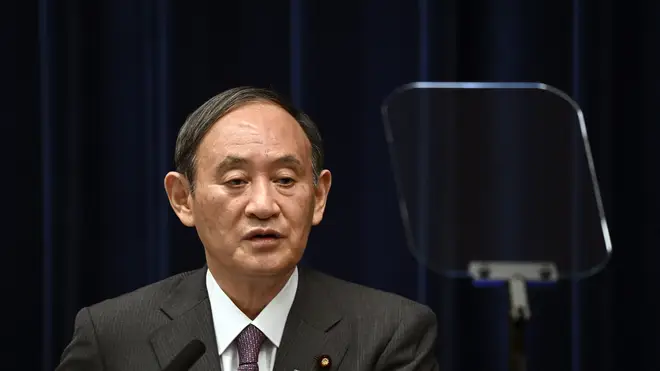
Ian Payne 4am - 7am
3 September 2021, 08:44

The politician’s support ratings have declined to around 26% amid criticism over the Olympics taking place during the pandemic.
Prime Minister Yoshihide Suga has said he will not run for leadership of the governing party at the end of this month, paving the way for a new Japanese leader after just a year in office.
Mr Suga told reporters he had originally planned to run in the September 29 race to lead his governing Liberal Democratic Party (LDP), but that leading Japan’s pandemic response and campaigning for the LDP job at the same time divided his energies.
“I have decided not to run for the party leadership elections, as I would like to focus on coronavirus measures,” he told reporters who rushed to his office after the news broke.
Mr Suga has faced criticism and nosediving public support over a coronavirus response seen as too slow and small and for holding the Olympics despite the public’s health concerns.
But he said he had put all his energy into important policies including the virus response since he took office.
Mr Suga said: “But doing both takes enormous energy and I have decided that I should just choose one or the other.
“As I have repeatedly told people, protecting people’s lives and health is my responsibility as prime minister, and that’s what I will dedicate myself to.”
LDP has the majority in parliament, meaning the new government leader is likely to be whoever is elected the party’s leader.
The official start of the campaign is September 17 and a few potential candidates have said they intend to run.
Candidacy requires factional support largely controlled by party heavyweights and their choices may not match those favoured in public opinion surveys.
Two potential candidates are former cabinet ministers in Shinzo Abe’s government: dovish former foreign minister Fumio Kishida, and former interior minister Sanae Takaichi, who shares the ultra-right wing ideologies of Mr Abe.
Others mentioned in the media include vaccinations minister Taro Kono and environment minister Shinjiro Koizumi.
Mr Kishida recently proposed a series of virus measures, including more funding, a pledge to secure more hospital beds and to create a health crisis management agency to centralise pandemic measures.

Mr Suga’s move is largely seen as a political decision so the LDP can have a fresh leader before national elections later this year.
The lower house term ends in late October and elections for the new parliament must be held by late November.
He took office in mid-September a year ago after his predecessor Shinzo Abe resigned due to health problems.
Mr Suga, the son of a strawberry farmer from Japan’s northern prefecture of Akita, enjoyed support ratings as high as 70% early in his tenure because he was a leader from the common people rather than blue-blood political families such as Abe.
He introduced a series of pragmatic measures including digital transformation and administrative reforms, but his support ratings slid quickly over his virus measures seen as too slow and too small to prevent growing outbreaks.
In the latest media surveys, support ratings have declined to around 26%.